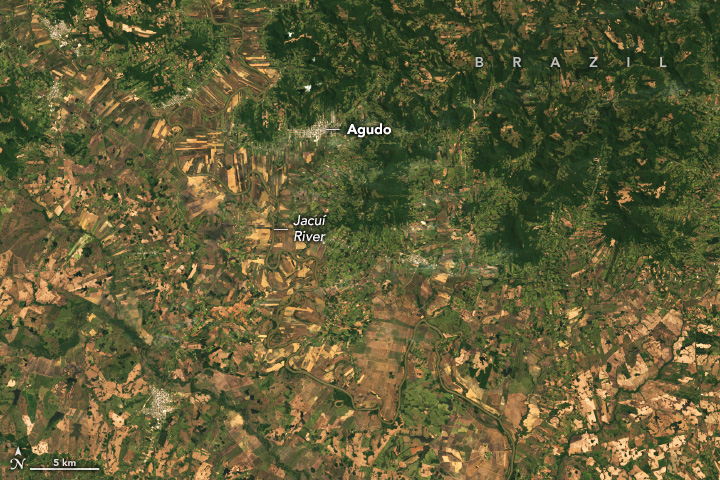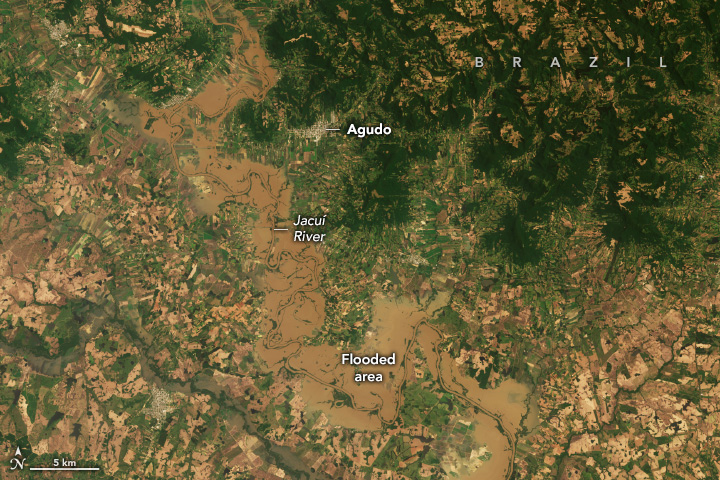

Flooding in Southern Brazil
Downloads
- riograndedosul_oli_2023309_lrg.jpg (1731x1154, JPEG)
- riograndedosul_oli_2023325_lrg.jpg (1731x1154, JPEG)
Metadata
- Sensor(s):
- Landsat 8 - OLI
- Data Date: November 5, 2023 - November 21, 2023
- Visualization Date: December 1, 2023
Two months after an extratropical cyclone hit southern Brazil, storms and flooding continued to wreak havoc on the region in mid-November 2023.
Severe thunderstorms dropped up to 4 inches (100 millimeters) of rain a day on southern Brazil starting on November 14, according to Brazil’s National Institute of Meteorology (INMET). Intense rain, lightning, and wind continued in Rio Grande do Sul and neighboring Santa Catarina for several days. According to news reports, multiple tornadoes touched down in Santa Catarina on November 18.
The image above, acquired by the OLI (Operational Land Imager) on Landsat 8, shows flooding on agricultural fields along the Jacuí River near the town of Agudo on November 21, 2023 (right), compared to November 5, 2023 (left). The Agudo government declared an emergency on November 24, noting extensive flooding and damage to roads and rice fields in the municipality.
Farther east, flooding continued along the Jacuí River near Porto Alegre, the capital city of Rio Grande do Sul. And near the city of Taquari, 84 miles (135 kilometers) east of Agudo, the Taquari River also burst its banks on November 18, flooding streets in the city.
A string of weather events has soaked southern Brazil since June 2023, when a winter storm brought torrential rain to Rio Grande do Sul. In September, a deadly extratropical cyclone battered 60 cities and affected more than 300,000 people in the state.
October and November were also particularly wet for southern Brazil. According to a bulletin issued by INMET, the average October rainfall was exceeded in 2023 by 12 inches (300 millimeters) in Rio Grande do Sul and Santa Catarina. Heavy rain that month slowed soybean planting in Rio Grande do Sul, according to Reuters.
But while southern Brazil has been anomalously wet, northern parts of the country have been abnormally dry. The water level of the Rio Negro in Brazil’s northern Amazonas state reached a record low in October 2023. Drought in the north also fueled wildfires in the Amazon rainforest.
INMET attributes the increased intensity and frequency of rainfall events in the south, and the dry weather in the north, mainly to El Niño, and the agency forecast these trends to continue into December 2023.
References & Resources
- Agudo government (2023, November 24) Agudo declares emergency situation after heavy rains and cancels opening of Natal de Luz. Accessed December 1, 2023.
- Brazil National Institute of Meteorology (Instituto Nacional de Meteorologia, INMET) (2023, November 22) November records above-average rain in part of the South Region. Accessed December 1, 2023.
- Brazil National Institute of Meteorology (Instituto Nacional de Meteorologia, INMET) (2023, November 22) El Niño 2023: November bulletin. Accessed December 1, 2023.
- Disasters Charter (2023, November 18) Flooding in Brazil. Accessed December 1, 2023.
- Fox Weather (2023, November 22) Days of torrential rain in Brazil causes deadly flooding, displacing thousands. Accessed December 1, 2023.
- NASA Earth Observatory (2023, June 24) Flooding in Porto Alegre, Brazil. Accessed December 1, 2023.
- NASA Earth Observatory (2023, October 20) Drought Fuels Wildfires in the Amazon. Accessed December 1, 2023.
- NASA Earth Observatory (2023, October 18) Drought on the Rio Negro. Accessed December 1, 2023.
- Reuters (2023, October 19) El Niño worries Brazil soy farmers as planting progresses, grain lobby says. Accessed December 1, 2023.
NASA Earth Observatory images by Wanmei Liang, using Landsat data from the U.S. Geological Survey. Story by Emily Cassidy.
This image record originally appeared on the Earth Observatory. Click here to view the full, original record.